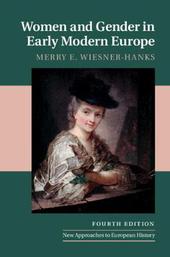
|
Women and Gender in Early Modern Europe
Hardback
Main Details
| Title |
Women and Gender in Early Modern Europe
|
| Authors and Contributors |
By (author) Merry E. Wiesner-Hanks
|
| Series | New Approaches to European History |
|---|
| Physical Properties |
| Format:Hardback | | Pages:390 | | Dimensions(mm): Height 235,Width 156 |
|
| ISBN/Barcode |
9781108496995
|
| Classifications | Dewey:305.409409031 |
|---|
| Audience | | Tertiary Education (US: College) | | Professional & Vocational | |
|---|
| Edition |
4th Revised edition
|
| Illustrations |
Worked examples or Exercises; 2 Maps; 13 Halftones, black and white; 11 Line drawings, black and white
|
|
Publishing Details |
| Publisher |
Cambridge University Press
|
| Imprint |
Cambridge University Press
|
| Publication Date |
24 January 2019 |
| Publication Country |
United Kingdom
|
Description
This fourth edition of Merry E. Wiesner-Hanks's prize-winning survey features significant changes to every chapter, designed to reflect the newest scholarship. Global issues have been threaded throughout the book, while still preserving the clear thematic structure of previous editions. Thus readers will find expanded discussions of gendered racial hierarchies, migration, missionaries, and consumer goods. In addition, there is enhanced coverage of recent theoretical directions; the ideas, beliefs, and practices of ordinary people; early industrialization; women's learning, letter writing, and artistic activities; emotions and sentiments; single women and same-sex relations; masculinities; mixed-race and enslaved women; and the life course from birth to death. With geographically broad coverage, including Russia, Scandinavia, the Ottoman Empire, and the Iberian Peninsula, this remains the leading text on women and gender in Europe in this period. Accompanying this essential reading is a completely revised website featuring extensive updated bibliographies, web links, and primary source material.
Author Biography
Merry E. Wiesner-Hanks is a Distinguished Professor of History and Women's and Gender Studies at the University of Wisconsin, Milwaukee. She is the senior editor of the Sixteenth Century Journal, an editor of the Journal of Global History, the editor-in-chief of the seven-volume The Cambridge World History (Cambridge, 2015), and the author or editor of thirty books and more than 100 articles or book chapters that have appeared in English, German, French, Italian, Spanish, Greek, Chinese, Turkish, and Korean. These include A Concise History of the World (Cambridge, 2015), Early Modern Europe 1450-1789 (Cambridge, 2013), and Gender in History: Global Perspectives (2010).
Reviews'Merry E. Wiesner-Hanks' Women and Gender in Early Modern Europe has long been a staple of classroom instruction. With this new edition she makes a fine textbook even better. Her addition of questions of global history, intersectionality, race, and consumer revolution are most welcome and will be highly relevant for contemporary classroom use. It remains the standard synthesis of the subject.' Christine Kooi, Louisiana State University 'This thoroughly revised edition of a classic overview remains the gold standard on the subject. Wiesner-Hanks' firm grasp of a sprawling and dynamic subject is astounding, particularly in her skill at providing a thoughtful and judicious introduction to a wide range of related questions and issues. Enthusiastically recommended for any reader interested in women and gender in any historical period or society.' Joel F. Harrington, Vanderbilt University, Tennessee 'No other text has yet surpassed Wiesner-Hanks' in clarity and depth of knowledge on women and gender in early modern Europe. Inside the covers of her book scholars and students will find a rich tapestry of individuals with complex selves brought to life by the author's fine prose. An invitation to rethink what it meant to be a woman in the early modern world.' Marta V. Vicente, University of Kansas 'Merry E. Wiesner-Hanks is a master of her craft. This textbook is packed with stimulating information and points for discussion on every page. Geographically and thematically wide-ranging, this remains an unrivaled overview. Issues of sexual identification, race and equality are central to discussions of current societies. This book offers an astonishing guide to their history. Not just relevant for early modernist or history students, this is a book which everyone interested in gender's past and future will enjoy and learn from.' Ulinka Rublack, University of Cambridge
|